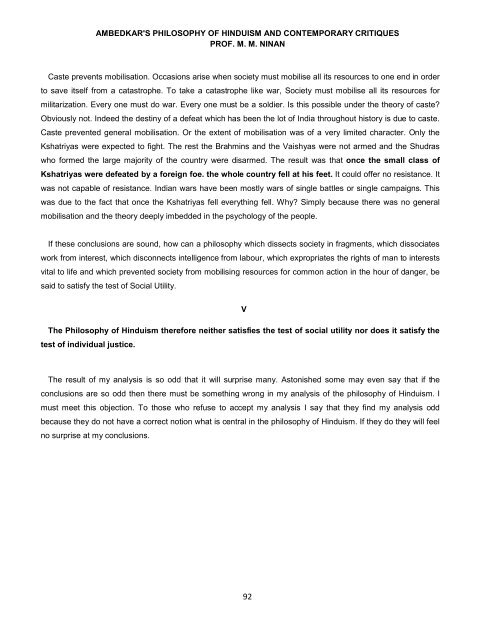Ambedkar-Philosophy of Hinduism
Create successful ePaper yourself
Turn your PDF publications into a flip-book with our unique Google optimized e-Paper software.
AMBEDKAR'S PHILOSOPHY OF HINDUISM AND CONTEMPORARY CRITIQUES<br />
PROF. M. M. NINAN<br />
Caste prevents mobilisation. Occasions arise when society must mobilise all its resources to one end in order<br />
to save itself from a catastrophe. To take a catastrophe like war, Society must mobilise all its resources for<br />
militarization. Every one must do war. Every one must be a soldier. Is this possible under the theory <strong>of</strong> caste?<br />
Obviously not. Indeed the destiny <strong>of</strong> a defeat which has been the lot <strong>of</strong> India throughout history is due to caste.<br />
Caste prevented general mobilisation. Or the extent <strong>of</strong> mobilisation was <strong>of</strong> a very limited character. Only the<br />
Kshatriyas were expected to fight. The rest the Brahmins and the Vaishyas were not armed and the Shudras<br />
who formed the large majority <strong>of</strong> the country were disarmed. The result was that once the small class <strong>of</strong><br />
Kshatriyas were defeated by a foreign foe. the whole country fell at his feet. It could <strong>of</strong>fer no resistance. It<br />
was not capable <strong>of</strong> resistance. Indian wars have been mostly wars <strong>of</strong> single battles or single campaigns. This<br />
was due to the fact that once the Kshatriyas fell everything fell. Why? Simply because there was no general<br />
mobilisation and the theory deeply imbedded in the psychology <strong>of</strong> the people.<br />
If these conclusions are sound, how can a philosophy which dissects society in fragments, which dissociates<br />
work from interest, which disconnects intelligence from labour, which expropriates the rights <strong>of</strong> man to interests<br />
vital to life and which prevented society from mobilising resources for common action in the hour <strong>of</strong> danger, be<br />
said to satisfy the test <strong>of</strong> Social Utility.<br />
V<br />
The <strong>Philosophy</strong> <strong>of</strong> <strong>Hinduism</strong> therefore neither satisfies the test <strong>of</strong> social utility nor does it satisfy the<br />
test <strong>of</strong> individual justice.<br />
The result <strong>of</strong> my analysis is so odd that it will surprise many. Astonished some may even say that if the<br />
conclusions are so odd then there must be something wrong in my analysis <strong>of</strong> the philosophy <strong>of</strong> <strong>Hinduism</strong>. I<br />
must meet this objection. To those who refuse to accept my analysis I say that they find my analysis odd<br />
because they do not have a correct notion what is central in the philosophy <strong>of</strong> <strong>Hinduism</strong>. If they do they will feel<br />
no surprise at my conclusions.<br />
92


















